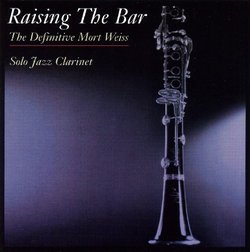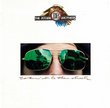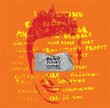A project of Olympian proportions: aiming for and achieving
Samuel Chell | Kenosha,, WI United States | 02/25/2010
(5 out of 5 stars)
""Definitive" may actually sound more presumptuous than "Raising the Bar" since it's a word commonly used in reference to an artist who has produced a prolific, often bewildering, number of recordings, inviting an enterprising company to put out a single-disc anthology with the word "definitive" in the title as a means of assuring the consumer that this is one way to score a representative collection of a favorite, prolific artist's work at a fraction of the time and cost that the artist's entire oeuvre would entail. So in the case of a "late-bloomer" like Mort Weiss, who has done well to put out a half dozen excellent CDs in the last several years, the word "definitive" could be a trifle misleading.
But guessing at Weiss' intended meaning, I'd suggest it's not supposed to connote a sort of "Best of" guide to the output of the gifted clarinetist: rather, it's meant to say, in effect, "Here's who I am. Here's my ultimate statement, a definite 'no-bones-about-it' answer to anyone who might question what I, my life, and my music are all about." A number of musicians these days are somewhat tentative about everything they do--exploring their "true identity," trying one approach after another--but often at the listener's expense (to which my response is often, "Give me a break. I've got enough to deal with in my own life without investing time in and rewarding the additional freight of your angst and experimentation").
However, Weiss is not being tentative and experimental much less indulging himself at the listener's expense. Moreover, to be as "definite," or "loud and clear," as he can be about his utterly unique accomplishment, Weiss foregoes all accompaniment--no drummer, no pianist, not even a bassist. (For the curious, Coltrane's very last recording was just tenor sax and drums. Sonny Rollins' best-known recording of "Body and Soul" is unaccompanied tenor sax, but that's only a single track. In the archived back corridors of my mind is the memory of a Herbie Mann flute album, "Man Alone," with just Herbie and his flute, but I'm not even sure about this.)
Pianists and guitarists have gone solo, of course, but those, along with any other "chorded" instruments, don't count. The challenge for an instrument capable of playing no more than a single melodic line at a time, and without multi-tracking or dubbing, is quite another matter. Not only does the artist have to maintain the strong implication of a harmonic and rhythmic foundation but, in addition to improvising on the melody, he must make enough explicit references to it to remind the listener of what the melody is as well as the improvisor's precise location in its development at any given moment.
That Weiss surmounts the aforementioned challenges is testimony to his creativity, his formidable (a musician would say "enviable") technique and acute ear not to mention his courage and determination; that he not merely succeeds but creates genuinely engaging, imaginative music is testimony to the countless hours of practice that enabled him to treat pyrotechnics as secondary to the creative process that leads to meaningful, enduring art. Usually, within 2-3 notes the listener of this album is able to identify the song even without the direct statement of the melody, and as "far out" as the music occasionally seems to go, never is the attentive listener at a loss for knowing where he is in the progress of the song--its chord progression or non-stated primary melody. Meanwhile, like an artist such as Art Tatum, Weiss is able to keep several melodies moving simultaneously--the composer's, the performer's, the performer's primary melodies, the performer's counter-melodies (either in call-response patterns to his own melodic ideas or in the turn-arounds between choruses or between structural markers, such as the bridge, in the song itself).
Although Coltrane was sometimes credited with playing "chords" because of his use of the harmonic series in the altissimo register, that's a misleading description. Yes, he was playing more than one note at a time (brass players can do the same using "multiphonics"), but it's still not what we normally think of as a "chord." Weiss' achievement is all the greater because he's playing "real" chords--chords, moreover, that actually aren't there. (It's only the supreme master who can "imply" that those chords are there to the listener, a performer who soon permits us to willingly suspend our disbelief because he's convinced us we're hearing all of the chords of the song--even the ones Tatum would have played explicitly).
Some "purists" and "hi-brows" will no doubt get addled about Weiss' repertory. Besides a standard like "As Time Goes By," he includes a couple of well-known songs that some would consider pop ephemera, or "period pieces," rather than "standards"--namely, Sinatra's "My Way" and Burt Bacharach's "Alfie." The point is that this is not merely "musician's music" (it is that, but much more). Moreover, unlike some artists whom I won't name, Weiss did not piece together this recording in a home studio, allowing himself months to come up with the exact, select tracks that he felt were examples of his "most perfect" clarinet artistry. The 70-plus year-old flew into Los Angeles, went into the recording studio, and what you're hearing (including a brief spoken "soliloquy" at the end of "My Way") is exactly what happened during the several hours he was in the studio.
Call it "definitive" or "definite" or (my choice) "distinguished." Regardless, this is a musical feat of Olympian proportions, and the bar has been raised to a level where it's not likely to be matched let alone elevated anytime soon."


 Track Listings (17) - Disc #1
Track Listings (17) - Disc #1
